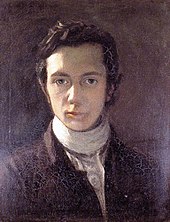William Hazlitt
William Hazlitt (born April 10, 1778 in Maidstone , † September 18, 1830 in London ) was an English essayist and writer.
Hazlitt was the son of a Unitarian clergyman. The painters John Hazlitt and Peggy Hazlitt were his siblings. His father moved the family to Bandon , County Cork , in 1780 and to the United States three years later . There he founded u. a. in Boston the First Unitarian Church .
In 1787 Hazlitt returned to Great Britain with his family and settled in Wem , Shropshire . At the request of the father Hazlitt should study theology and this he tried at Hackney College in London. After a year Hazlitt dropped out of his studies and tried an artistic training in Paris . He broke this off in favor of literature. His brother John was now in training with Sir Joshua Reynolds .
Back in London, he soon made a name for himself among the romantics . He made friends with Samuel Taylor Coleridge and William Wordsworth . He also made the acquaintance of siblings Charles Lamb and Mary Lamb . In 1808, at the age of 30, Hazlitt married Sarah Stoddart, a close friend of the Lamb siblings. Through this marriage, John Stoddart , editor of The Times, became his brother-in-law. Hazlitt and his wife settled in Winterslow , Salisbury .
From 1812 Hazlitt worked full-time as an essayist for various newspapers and magazines such as The Times and Edinburgh Review . As he was successful professionally, his marriage had increasing problems. In 1819 Sarah separated from Hazlitt, and in 1822 the marriage was finally divorced.
From 1820 Hazlitt lived in a small guesthouse in London and had an affair with the 19-year-old daughter of the house, Sarah Walker. He hoped to marry her after his divorce, but was turned away. Disappointed, he anonymously published a little veiled account of his love for Sarah Walker under the title Liber Amoris . Its authorship did not remain hidden for long. A scandal broke out and his journalistic career came to an end.
In 1824 he married a second time, Isabella Bridgwater, b. Shaw, which he never mentions in any of his works.
Impoverished and lonely, William Hazlitt died on September 18, 1830 in London and was buried in St. Anne's Cemetery in Soho.
It was precisely his essays that established Hazlitt's fame. They comment on and reflect the zeitgeist in an unadulterated way and have for the most part not lost their importance to this day.
Works
- The Characters of Shakespeare's Plays (1817)
- The Round Table (1817)
- A view of the English stage (1818)
- Lectures on the English poets (1818)
- Lectures on the English Comic Writers (1819)
- Lectures on the Dramatic Literature of the Age of Elizabeth (1820)
- Liber Amoris, or The New Pygmalion (1823)
(German translation in: Liber Amoris. Das Buch der Liebe / Peter Priskil. An early case of Polanski. Freiburg / Br .: Ahriman 2016 ISBN 978-3-89484-903-0 )
- The Spirit of the Age, or Contemporary Portraits (1825)
- The Life of Napoleon Bonaparte , London undated (digitized: Vol. 1 , 2 ,
3 , 4 , 5 , 6 , 7 , 8 , 9 , 10 , 11 , 12 , 13 , 14 , 15 , 16 )
Translations
- About the Pleasure of Hating and Other Essays . Translated from English and commented by Holger Hanowell. Reclam, 2017 [What does it all mean?] ISBN 978-3-15-019442-3 .
Web links
- Literature by and about William Hazlitt in the catalog of the German National Library
- Hazlitt Society website
| personal data | |
|---|---|
| SURNAME | Hazlitt, William |
| BRIEF DESCRIPTION | English essayist and writer |
| DATE OF BIRTH | April 10, 1778 |
| PLACE OF BIRTH | Maidstone |
| DATE OF DEATH | September 18, 1830 |
| Place of death | London |
